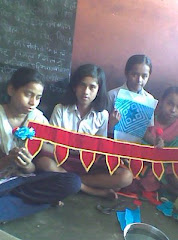by Shree Venkatram
Dowry: Age-Old Tradition or Contemporary Cruelty?
Three years after Gudiya's marriage, Bina is still repaying the Rs 30,000 ($660)she took as loan to buy her daughter's dowry. When Gudiya left for her marital home, she took with her: a double bed, an almirah (traditional Indian wooden chest), a dressing table, a TV, a washing machine, utensils, gold jewelry and a suitcase full of new clothes for her and her in-laws.
But in the slum where she lives, Bina does not even have a bed, let alone a washing machine. However, she had to give one to her daughter’s in-laws when they demanded it. The total expenditure for the wedding was over Rs one lakh approximately $2,230), 33 times the amount of money Bina makes per month as a housemaid in Delhi. The amount includes Rs 70,000, ($1,550) all that she and her carpenter husband had saved over the course of 15 years. Bina has already started worrying about finding funds for her second daughter,Babina’s, wedding. “Who will marry her without dowry?” she asks. And so the family will eat only one meal a day and cut down on other necessities so that three years from now, when Babina is 20, there will be some money available.
Even in poor homes, marriage expenses can run into several hundred thousands of rupees. In better-off homes, dowry might include a car, furniture and furnishings for a new home, expensive jewels, and a wedding feast for several hundred friends and relatives in a five-star hotel.
The monetary hardship that dowry brings can be directly linked to the astonishingly skewed female to male ratio (in some districts, there are as few as 800 females to every 1,000 males). In many cases, the birth of a daughter is a fate to be avoided at all costs; foeticide and infanticide are all too prevalent. Families who do raise their female children spend just the bare minimum on her education and often neglect her health needs; money must be saved for her dowry, whatever the cost.
At one time, dowry was only practiced by upper caste Hindus who gave gifts of clothes and jewelry to their daughter at the time of her wedding. The movable property, perceived as her share from her natal home, was made available to her when she left for her marital home. The in-laws welcomed her with gifts that were to match what she had received from her parents; this was to show equality in status. Gifts were also exchanged between members of the two families to cement their ties.
In Bangalore, Three to Four Newly Married Women Die Every Day
But over time, especially in the last three to four decades, a practice that once signified paternal love, has become ugly, vicious, and deadly. Thousands of young women have been tortured and murdered at the hands of husbands and in-laws, greedy for unearned wealth in the form of dowry. Official records in the South Indian city of Bangalore show three to four newly married women die unnatural deaths every day. In the capital city of Delhi, Ms. Vimla Mehra, Joint Commissioner of Police, Crime Against Women Cell, says she received over 8,000 complaints from women in 2003, a majority of them related to dowry.
Although a law passed in 1961 forbidding the dowry system, there have been hardly any convictions since that time. Young women who did not bring dowry up to the husband and in-laws’ satisfaction were tortured until their parents gave into the demands. Many women were, and are, driven to suicide. A sinister and rising trend is newly married women dying after catching fire from kitchen stoves. These deaths are being passed off as accidents or suicides, leaving the husband free to marry again and get more dowry. Under pressure from women’s groups, amendments to the law were made in 1983 and 1986, broadening the definition of cruelty, putting the onus on the accused, and providing for a minimum of seven years of imprisonment for dowry murder.
But laws have proved ineffective and dowry’s stranglehold on Indian society has only become stronger now that tribal and matrilineal communities, who previously never gave dowry, are adopting the custom. “It is truly a secular custom now,” comments Brinda Karat, president of the All-India Democratic Women’s Association (AIDWA.
According to a recent extensive study, dowry has spread in the length and breadth of the country. Bina may be a Christian, and her daughter may have married in a church, but when it came to putting together the dowry, there is no difference between Bina and her Hindu neighbors or the Muslim families living in her slum cluster.
Feminists, social activists, and reformers are truly alarmed. Breaking the practice is proving extremely tough. While on one hand they work at educating the girl child and providing for inheritance rights for women, century old customs prove difficult to break. There have been instances of women who got married without dowry being denied any right to property in their natal home by their parents. Take Geeta, for example. She got married without dowry to a man of her choice. Before his death, her father willed his entire property to her two brothers, giving her no share.
On the other hand, rising materialism, consumption, and advertising power continue to boost the practice of dowry. It is seen as a get-rich-quick facility exploited by the groom’s family. Goods the groom’s family have seen and desired, but not been able to afford, are demanded from the girl’s side.
Marriage is big business in India—estimated to be a Rs 50 billion (about $1.1 billion). A mega mall, devoted to the business of marriage, is coming up in a Delhi suburb, Gurgoan. Delhi recently saw a couple of fairs at luxury hotels that sold lavish 16-course wedding dinners, luxury cruises and honeymoons abroad,exorbitant designer wear and jewelry at mind-boggling prices. Is it the new face of dowry?
2004-09-29
First published inhttp://www.voices-unabridged.org/format/creat_ss_format.php?id_ss_article=224.jpg)





+(2).jpg)

